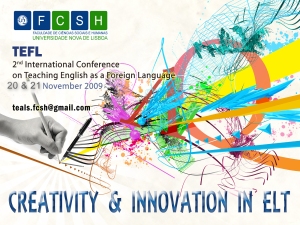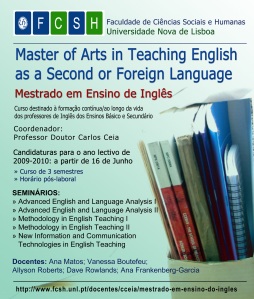
May 27, 2009
TEFL – 2nd International Conference on Teaching English as a Foreign Language – 20 & 21 November 2009
Posted by Helena Oliveira under UncategorizedLeave a Comment
May 24, 2009
Master of Arts in Teaching English as a Second or Foreign Language
Posted by Helena Oliveira under Uncategorized | Tags: fcsh, inglês, mestrado |Leave a Comment

April 30, 2009
These are the facts: Chain stores dominate our high streets. Adverts dominate our media. And brands dominate our culture – to the extent that owning the right products defines what it is to be normal. For some people this isn’t an issue – they shop for pleasure, they love the big brands, and they feel comfortable being sold to all day. I’m not one of those people. Well, not anymore. I’ll give you three reasons why:
1. Non-essential consumption is a root cause of the situation we find ourselves in today – the environment, the economy and popular culture are all affected by the drive towards consumer growth.
2. Consumerism doesn’t work – in that it’s supposed to make us happy. Not in any sustainable way. Shopping is like a drug – the instant high is fantastic, but it’s never enough.
3. We’re starting to lose the choice. There are millions of consumer choices on the shelves. But alternatives to consumerism isn’t one of them. It’s virtually impossible to live brand-free and be normal.
April 30, 2009
The Delivery, Til Nowak
Posted by Helena Oliveira under Environment | Tags: Environment |Leave a Comment
April 17, 2009
Anti Discrimination Advert
Posted by Helena Oliveira under Discrimination | Tags: Discrimination |[2] Comments
March 14, 2009
Tropfest NY 2008 winner, “Mankind Is No Island” by Jason van Genderen
Posted by Helena Oliveira under UncategorizedLeave a Comment
February 27, 2009
The Museum of Tolerance
Posted by Helena Oliveira under Discrimination | Tags: Discrimination, holocaust, war |1 Comment
The Museum of Tolerance has prepared a comprehensive guide for Teachers to use in their classrooms to enhance and sustain the Museum experience.
The guide includes an introduction to the Museum’s focus and themes, a preview of the Museum tour, vocabulary and an introduction to standards-aligned lessons and activities. The lessons are available individually online.
Staying Connected
Stay in touch with the Museum and connect with other teachers through the For Teachers section of this web site designed specifically for educators. The password-protected site includes a bulletin board for teachers to share ideas, additional lessons and activities and the opportunity to share best practices.
In addition to the material we provide, we encourage teachers to share the activities they have used successfully in their classroom.
February 22, 2009
Online English Corpus
Posted by Helena Oliveira under Teenagers | Tags: Teenagers, youth |1 Comment
Online English Corpus with several clips for you to use in your lessons.
Examples:
- Conversation with Viveca and Megan, 13 years old from Reading. They talk about holidays, school, plans for the future and their daily routines and hobbies.
- Interview with Josie, 13 years. She talks about her routines, her hobbies and her life in Reading.
- Interview with Hannah who is interested in languages and wants to become a linguist. She spent her holiday in France and talks about Britains in EU. She is learning self defence.
- Joseph talks about his plans for university and his interest in Economics which he will study after his gap year when he is going to Africa. He plays basketball, likes music and has recently travelled around Europe by train.
- …
A special thank you to Anne Frankenberg for sharing this, and other, wonderful websites with my colleagues and I.








